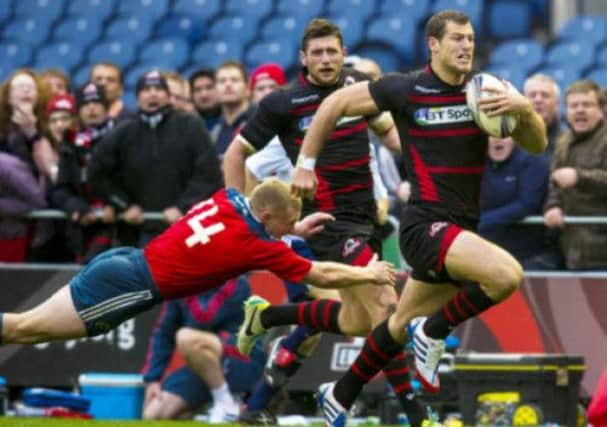Allan Massie: Last year’s capital vintage hasn’t soured


All I can say is that it didn’t look like it. Against Cardiff they were timid and limited; against Munster bold and adventurous straight from the kick-off. They fully deserved their victory, even though Munster will have returned home knowing that they themselves had more than enough chances to win the match.
Interestingly Cornell du Preez was the only one of Edinburgh’s new southern-hemisphere signings to start against Munster. Of the XV that took the field, all the back division, except Jack Cuthbert, and all the pack, except for Du Preez and Alasdair Dickinson, were with Edinburgh last season. One shouldn’t read too much into one match; nevertheless this victory supports one’s opinion that it was not the material available that was at fault last year, but the way the players were handled and the style in which they were told to play.
Advertisement
Hide AdAdvertisement
Hide AdThe return of Matt Scott undoubtedly made a difference. He took his try well, though if he hadn’t made it to the line, he would doubtless have been censured because there was a two-to-one outside him. Both he and Nick de Luca attacked the line and also tackled excellently. Young Harry Leonard miscued a couple of grubber kicks, on the first occasion ignoring an overlap outside him, but generally played with an agreeable authority. He is coming along very well, and surely merits an extended run in the team. Greig Laidlaw, apart from also having a kick charged down – a mistake which led directly to a Munster try -–was outstanding, proving once again that even today scrum-halves don’t have to be built like flankers; he outplayed Munster’s Lion, Conor Murray.
The forwards were generally good. Sean Cox stole three Munster line-outs, which is remarkable. To win a couple of them he got up in front of Paul O’Connell, which is still more remarkable. David Denton had a terrific match. Du Preez looked good and the Georgian flanker Dimitri Basilaia had the best match I’ve seen him play.
The Toulon-Glasgow game was astonishing, even weird. Glasgow were bewitched, bothered and bewildered by Toulon’s first-half brilliance; nevertheless they showed great spirit and skill to come back in the second half, so formidably that there was a brief moment at 41-28 when one thought they might even snatch what would have been an extraordinary victory. As it is, to take a bonus point in Toulon is as much as pretty well any team can hope for against the International All-Stars.
More generally – and one writes this with fingers metaphorically crossed – the reformed scrum laws seem to be working well. Fewer scrums are collapsing. We have even seen a number of occasions when the ball has been smoothly heeled and the scrum-half has been able to pass straight to his stand-off. Even more remarkably, referees are, sometimes at least, insisting that the ball be put in straight.
Elsewhere there was a very good article by Mick Cleary this week, deploring the lavish use of replacements which is making rugby into a 23-man game rather than a 15-a-side one. He made the excellent point that this not only disrupts the flow of play, but denies a stronger scrum, and especially dominant props, the advantage that used to be enjoyed over tired opponents in the last 20 minutes of a match. Coaches love having replacements available, because it enables them to influence the course of a match, but I doubt if any spectators welcome the constant coming and going of players in the last quarter. This is acceptable in the amateur game, where in any case there are fewer substitutes on the bench, because amateurs consigned to replacement duty and not used will reasonably feel aggrieved and may soon lose their enthusiasm. But the professional game is being damaged, and sometimes rendered absurd, by the flood of replacements. The IRB should restrict the number that may be used.
Finally, the former England scrum-half Austin Healey has been airing the old line about French teams travelling badly. Now they do lose a fair number of Heineken matches this side of the English Channel, but then they cross it more often than others do. I suspect that analysis of results would show that French clubs win as often in England as English ones do in France. It would be a surprise if this wasn’t so.
Over the last dozen years France have a better away record in the Six Nations than any other country – even though by their own high standards they have been poor for the last couple of years. The truth is that winning away from home is difficult, no matter your nationality. Saracens are sitting on top of the Aviva Premiership, but they nearly came a cropper in Galway last week – against a club, Connacht, who, according to the English, shouldn’t even be in the Heineken – while Healey’s former club, Leicester, lost in Belfast. Perhaps Tigers don’t travel well.